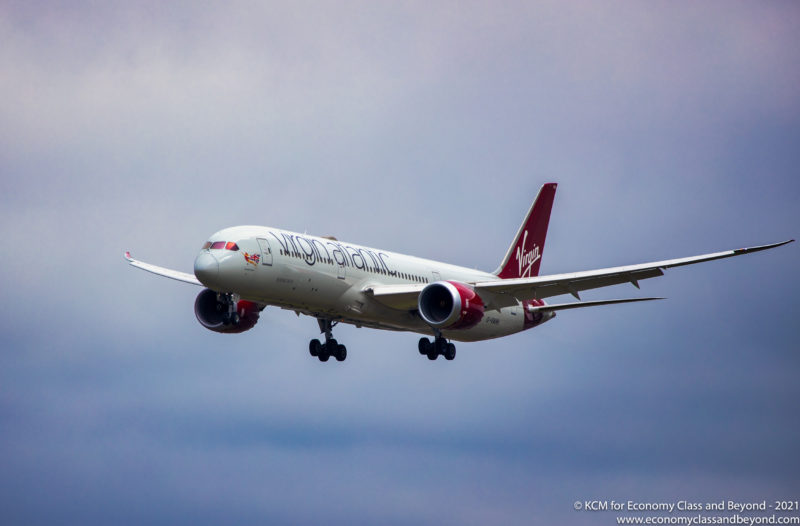It seems the drive for airlines and manufacturers to demand Sustainable Air Fuel continues apace, with Virgin Atlantic and Neste Oyi announcing a partnership.

Virgin Atlantic Boeing 787-9 on final approach to London Heathrow – Image, Economy Class and Beyond
The agreement will cover a supply to the United Kingdom of 2.5 million litres/2,000 metric tonnes of neat Sustainable Aviation Fuel (SAF), which will be delivered in the first half of 2022 to London Heathrow.
The move is part of the goal for the airline to move to use 10% SAF by 2030. It will in theory boost the availability and use of SAF in the UK.
Neste MY Sustainable Aviation Fuel is made from sustainably sourced, renewable waste and residue raw materials. In its neat form, it can reduce greenhouse gas emissions by up to 80% of life cycle, compared to traditional fossil jet fuel.
To assist in the distribution, Virgin Atlantic and Neste have turned to ExxonMobil’s expertise in the supply and distribution of jet fuel to manage this delivery of SAF into the UK. ExxonMobil is Virgin Atlantic’s largest fuel supplier at London Heathrow.
The agreement with Neste represents the first commercial supply of SAF for Virgin Atlantic, following its long-standing commitment to SAF and operation of the first commercial aircraft using sustainable fuels in 2008.
In Quotes
Holly Boyd-Boland, VP Corporate Development, Virgin Atlantic said:
“After fleet renewal, SAF represents the greatest opportunity to decarbonise aviation in the short to medium term. This supply is the beginning of commercial SAF at scale for Virgin Atlantic and whilst only enough to operate 140 flights** between London and New York, it’s a starting point.
“To meet our 10% SAF target in 2030 we need to deliver this volume more than seventy times over, requiring cross industry and Government action to support commercialisation of SAF at scale, particularly in the UK. We will continue to work closely with Neste and ExxonMobil, as well as wider industry partners, to find innovative solutions to achieve this goal.”
Jonathan Wood, Vice President Renewable Aviation from Neste, said:
“We are delighted to provide Virgin Atlantic with our Neste MY Sustainable Aviation Fuel. Neste is committed to working together with the aviation industry to achieve its emission reduction targets. We are ready to support the aviation industry and UK government’s policy ambitions to increase the use of SAF to at least 10% by 2030. We need to act now – SAF is a proven solution with clear climate benefits and is already available today.”
Paul Greenwood, Chairman of Esso UK Ltd (a subsidiary of ExxonMobil), said:
“We’re proud to play our part in this pioneering agreement, facilitating a safe, secure and reliable supply of lower emission aviation fuel via our dedicated pipeline network.”
So, where is all this SAF is going to come from?
Airlines and manufacturers are loving the idea of Sustainable Air Fuel, which gives the good vibes of attempting to close the loop in terms of carbon emissions.
However, just to meet Virgin Atlantic’s desires to use SAF, production will have to increase seventy-fold over – and that’s just to meet 10% usage.
As was pointed out in the ATR article, Neste currently has an annual capacity of 100,000 tons of SAF, with them aiming to scale to 1.5 million tons of SAF annually by the end of 2023.
That compares with 95 billion gallons of Aviation Fuel that are currently being used currently per annum (in 2019).
Action will be needed – by all ends of the industry- to push forward both Virgin Atlantic desire to use more SAF, let alone the entire industry, as it competes with biofuels and good old Jet1A.
It’s going to be a challenge, as SAF should not compete with food crops, agricultural land, natural forests or freshwater supplies, whilst having that sustainability mark slapped on it.
Welcome to Economy Class and Beyond – Your no-nonsense guide to network news, honest reviews, featuring in-depth coverage, unique research, as well as the humour and madness as I only know how to deliver.
Follow me on Twitter at @EconomyBeyond for the latest updates! You can follow me on Instagram too!
Also remember that we are part of the BoardingArea community, bringing you the latest frequent flyer news from around the world.
Great to see more efforts to develop sustainable fuels for aircraft – my worry is whether or not we can scale them up fast enough.
Did anyone else read that as “Nestle” at first and wonder if someone had come up with a way to make fuel from chocolate? 🙂